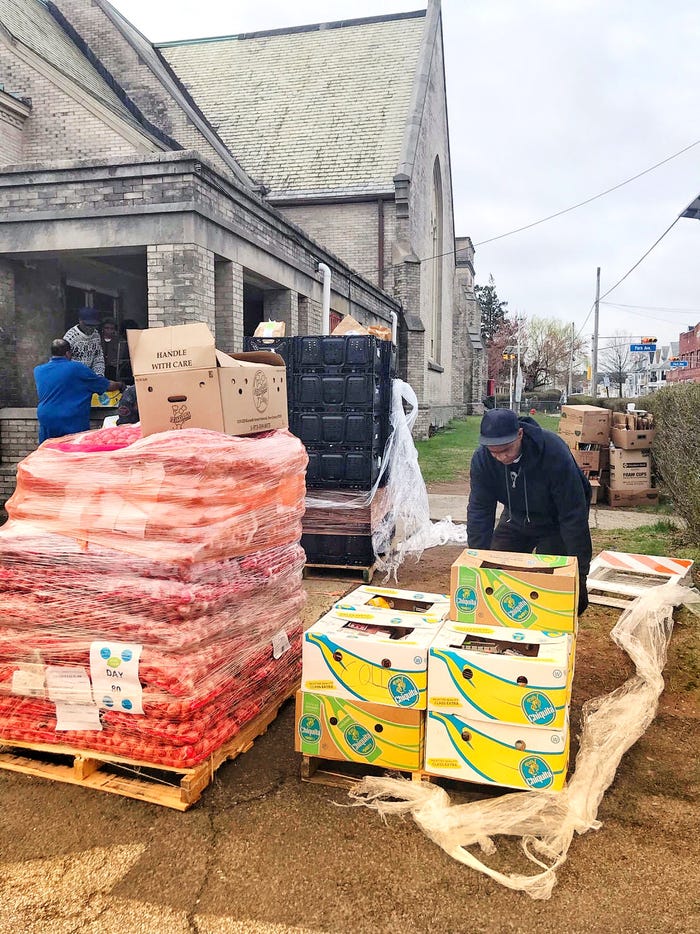New York Food Waste Law Unlocks Economic Opportunity
State-level initiatives are essential to reducing food waste faster and more efficiently, but they are still in their infancy.
The United States wastes $218 billion per year growing, processing, transporting and disposing food that never gets eaten, according to ReFED. That represents almost 2 percent of our nation’s gross domestic product, yet one in six Americans is food insecure. On top of that, decomposing food waste represents 5 percent of our greenhouse gas emissions, a potent contributor to climate change.
New York State alone spends $36 million per year solely to transport and dispose of excess food. But there's good news: a new law banning landfilling of food waste in New York State is estimated to provide a net economic benefit of nearly $22 million per year, along with recovery of 52 million new meals a year with a 10 percent increase in food donation to 2.8 million food insecure New Yorkers.
State-level initiatives are essential to reducing waste faster and more efficiently, but they are still in their infancy. New York became only the sixth state in the country to enact a statewide food waste disposal ban when Gov. Andrew Cuomo recently signed the Food Recovery and Recycling Act. Massachusetts, with a population less than half that of New York, already generated $175 million in economic activity within the first two years of implementing a similar bill in 2014.
As the third largest state economy, any law that impacts New York business will have a reverberating national economic impact. Therefore, this law has the potential to help both local and national business capture $2 billion in increased profits from waste prevention and reduction efforts. This financial benefit is in addition to the tax incentives from the donation of unsold foods, cheaper food and hauling costs and job creation as recycling infrastructure is developed.
What are the Requirements of the Food Recovery and Recycling Act?
All businesses that generate 2 or more tons of food waste per week at a single location, which will include supermarkets, large foodservice businesses, higher education institutions, hotels, correctional facilities and sports or entertainment venues, are required to donate unsold but edible food whenever possible.
Businesses that both meet this waste generation threshold and are within 25 miles of an organics recycler with sufficient capacity will also be required to recycle their food waste.
Subject businesses can request to be exempt from these requirements based on “undue hardship,” including by showing that the cost of processing food waste is not reasonably competitive with the cost of disposing of waste by landfill.
Exempt businesses automatically include all businesses within New York City, which must comply with the city’s existing food waste recycling law, as well as hospitals, nursing homes, adult care facilities and elementary and secondary schools.
What Food Waste Reduction Efforts Can Businesses Employ Now?
While there is no one-size-fits-all solution, supermarkets, restaurants and foodservice operators can implement strategies to reduce wasted food that are both cost effective and scalable no matter the size of the operation. These consumer-facing businesses can recapture profit at an estimated rate of $7 per $1 of investment and simultaneously elevate their brands to meet the expectations of the increasingly values-driven consumer by implementing food waste reduction efforts.
Considering nearly 85 percent of all wasted food is generated by consumers and consumer-facing businesses combined, food businesses that sit at the nexus of consumers and suppliers have a major opportunity to educate their vendors and the public on the positive financial, environmental and social impact of preventing, donating and recycling surplus food.

Table to Table delivering donated food to United Methodist Church in Orange, N.J.
Here are six practical steps companies can take today to address the solvable problem of wasted food:
Conduct a waste audit to understand where the losses are and how much they cost the business. Conducting an audit is essential to understanding the sources of waste (kitchen or post-consumer), its composition, amounts and costs associated with wasting food and will inform which solutions should be prioritized to save money and streamline operations. Waste audits can be simple, no-cost exercises using paper and pen or can be done with sophisticated prevention technologies like LeanPath or Winnow.
Be smart about demand planning and inventory management. Be strategic about purchase orders to reduce unnecessary waste and work with suppliers that do not require costly purchase minimums. For retailers, dynamic pricing is a great way to push product and still capture profit. For foodservice operators and restaurants, empower chefs to be creative and flexible to use surplus ingredients in menus and product offerings. For inspiration, check out Spare Food Co.
Get to know local food recovery organizations and create partnerships to quickly and safely get unused food to shelters or food banks. If you can offer up a refrigerated truck or cold storage, do it. This can be the largest obstacle to a food bank accepting a donation. When food that is still edible is rescued, it saves money on hauling costs, provides valuable tax deductions back to the business and builds community. Find your partner here.
Train and incentivize staff to participate in waste reduction efforts. Create challenges or give bonuses to incentivize employees to understand the implications of wasted food for both back of the house and front of the house food management. Training costs valuable time and resources upfront but will pay off if these practices are instilled into company culture. Training also can help avoid costly fines for mismanagement of organics in the future, no matter what type of food business you are in.
Cash in on the values-driven consumer. Differentiate yourself from your competitors and share your waste reduction journey. Whether it’s creating actionable social media content to inspire your customers to reduce waste in the home or designing menu options using upcycled or imperfect foods, the majority of consumers want—and now expect—companies to engage in environmentally friendly activities.
Reduce both pre-consumer and post-consumer packaging waste. If you sell packaged foods in your store or cafeteria, work with brands with smarter packaging design (resealable, compostable, vacuum-sealed, etc.). If your business generates post-consumer waste, use clear signage and messaging near recycling and trash bins and include images of products actually sold in your store to help the public understand your system and avoid cross contamination.
How Will the New Law Help New York Businesses Reduce Food Waste?
The Food Recovery and Recycling Act will make it easier for businesses to reduce food waste, in part because it will encourage development of food donation and recycling infrastructure. It will take time for recycling and food donation infrastructure in New York to expand to meet the needs of the food waste disposal ban, but the ban creates a supply of potential customers that will encourage expansion of existing infrastructure.

In recognition of this issue, the New York State Department of Environmental Conservation will evaluate the available recycling infrastructure and notify affected businesses if they are required to comply with the food waste recycling requirement. A similar evaluation was performed by the City of New York Department of Sanitation when the city implemented its organics recycling law. New York’s City’s evaluation of available recycling infrastructure has been challenged by affected businesses, which suggests that the Food Recovery and Recycling Act may face similar challenges. Regardless, New York State’s recycling infrastructure will expand, thereby reducing costs and creating more tailored options and solutions for reducing food waste.
Other businesses and local governments can take advantage of the example set by New York and other early adopters of food waste recycling laws to encourage development of food waste policy. Momentum is building nationwide; Missouri and New Jersey are actively considering food waste disposal bans similar to the one enacted in New York; and the issue of wasted food is being considered more generally by many other states, including Illinois, Kentucky, Maine, Maryland, New Mexico, Tennessee and Washington. But businesses don’t need to wait for government action to make a difference; they can have a significant impact on the environment and their bottom line by implementing food waste reduction efforts now.
Eva Goulbourne is the founder and CEO of Littlefoot Ventures, a consultancy promoting environmental stewardship within food business. She is a recognized food waste and sustainability expert and founding team member of Rethink Food Waste Through Economics and Data (ReFED).
Matthew Karmel is an attorney at the law firm of Riker Danzig Scherer Hyland and Perretti LLP, where he practices environmental law; and he also serves on the boards of the New Jersey Composting Council, an industry group that promotes organics recycling and compost utilization, and Table to Table, a New Jersey-based food rescue organization.
About the Authors
You May Also Like




